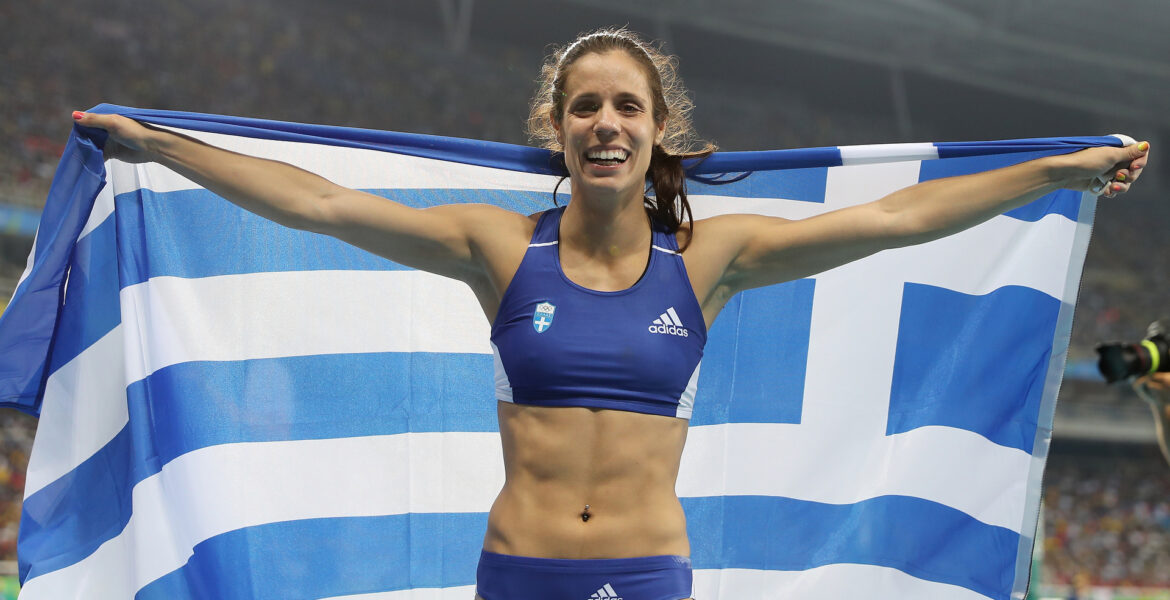Katerina Stefanidi is a Greek pole vaulter. She was born to athletes Georgios Stefanidis and Zoi Vareli, who competed internationally in the triple jump and sprints, respectively. Her younger sister, Georgia, is also a pole vaulter. Stefanidi won the gold medal at the 2016 Olympic Games with a jump of 4.85 metres. She has won a total of ten medals in all five major international athletics championships. In 2015, she married Mitchell Krier, her future coach and also a former pole vaulter. She currently lives in the United States.
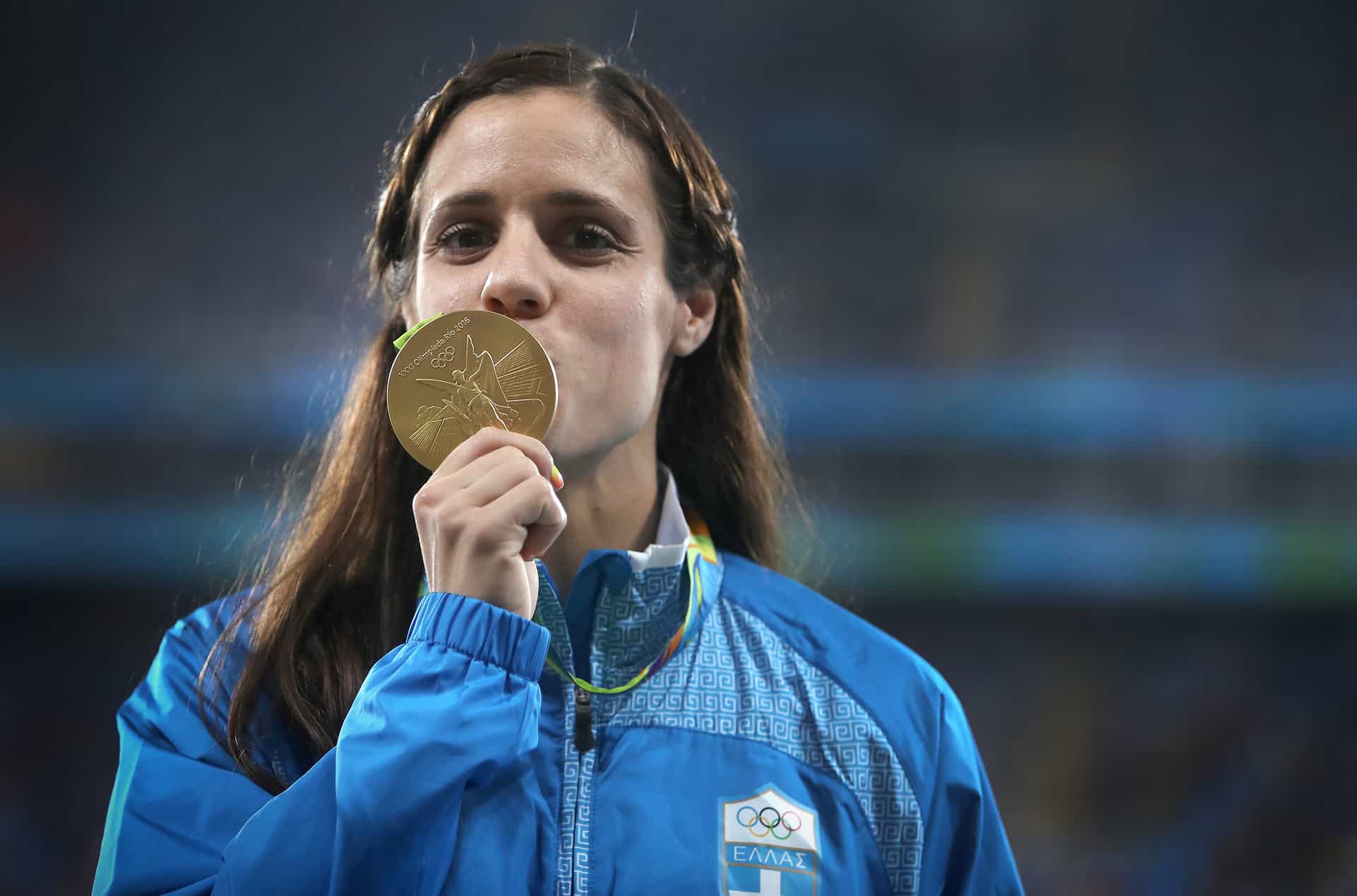
Were you into sports during your formative years?
I was always into sport. I had way too much energy as a child and sport was a great way to channel that. I was fortunate to go to the National Bank of Greece summer every year for several weeks where I was able to try many different sports, something which wouldn't have been possible otherwise.
Did you have to train hard by having your parents serve as an example?
Quite the opposite (giggles). If you asked my mother during my teenage years she would probably tell you I was pretty lazy. And honestly I still am. But I am also very motivated and very disciplined. So while my parents didn’t necessarily teach me to train hard they instilled in me other characteristics that helped with my training. Not to say that I don’t train hard. I do. But I’m not the kind of athlete that will push her limits so much and pass out during a workout (which I have had teammates do). I train smart and I train focused.
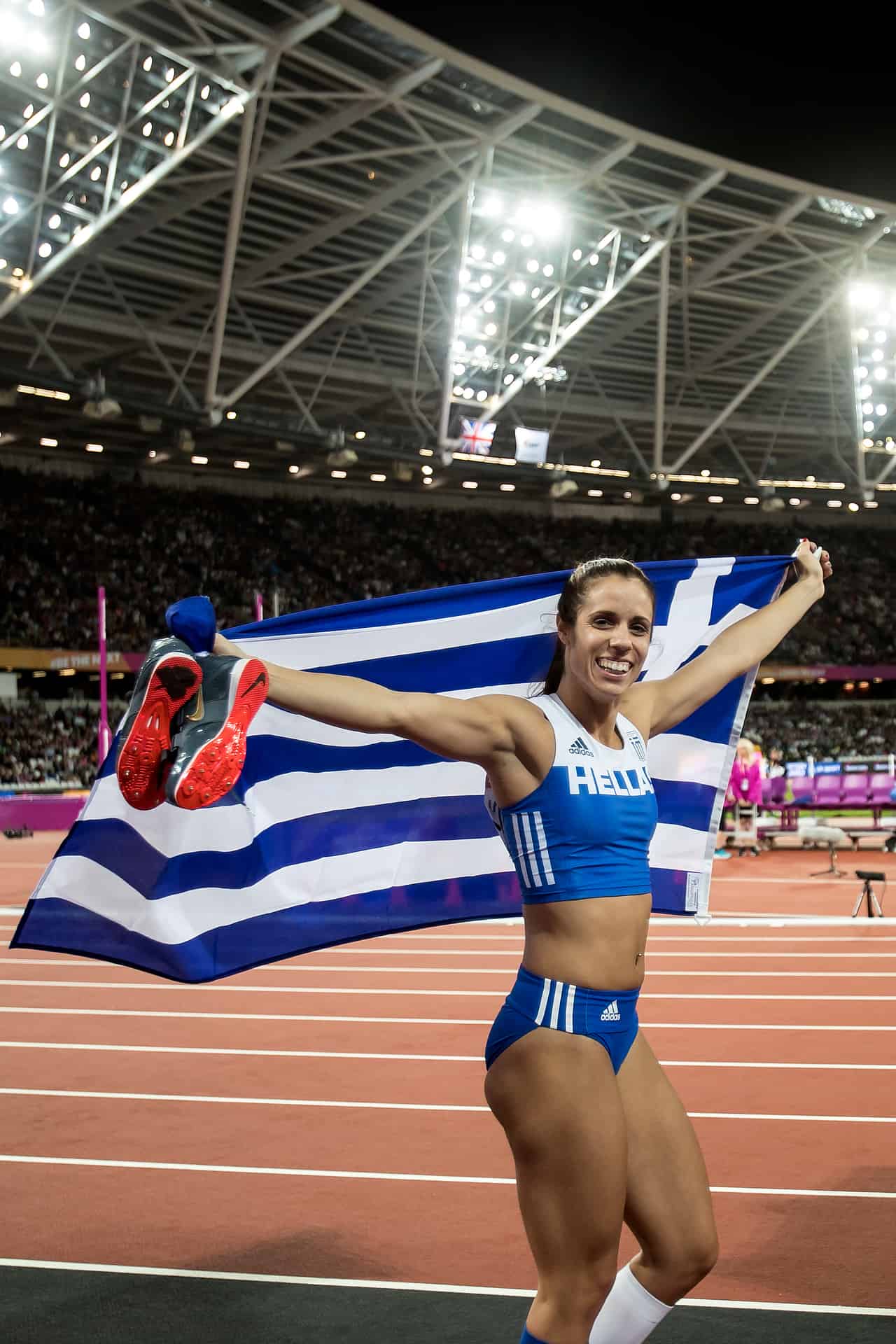
How did your career progress?
As a young kid into pole vaulting I had some early success, breaking several world age-group records at a young age (now don’t ask me how many girls were really pole vaulting at 12 years old back in 2002 haha). But not to bring me down. I still hold a couple of those age-group records. Around 16 years old I started struggling with my weight. I even quit for about half a year. Then I started receiving scholarship letters from US universities. It sounded like a great idea, to use pole vaulting to get a good education as my parents would have never been able to afford tuition. I ended up at Stanford in 2008. Competing in the NCAA saved my career. The transition from youth/junior success to senior can be really hard on athletes especially athletes that had successful youth/junior careers. The NCAA gave a great stepping stone between my youth/junior career and my senior career. I remained competitive and I remained motivated. After graduating and already having had a go at the London Olympics I knew that I wanted to continue both my athletic and academic career. That’s how I ended up in Phoenix training with the 2000 Olympic Gold Medalist and a great group of people. In the next couple of years I would get my first couple of senior medals and start being considered a favorite in most Championships I competed in. In 2015 I decided to take a break from my academic career and only train for a year. I moved to Cleveland with my husband as a coach now. 2016 was a dream year. Our motivation to succeed together got us an Olympic Gold medal. Since then, and like any elite athlete I’ve had good and bad seasons. Sometimes, injuries, lack of motivation, and sometimes too much motivation. But I have been able to keep myself at the top.
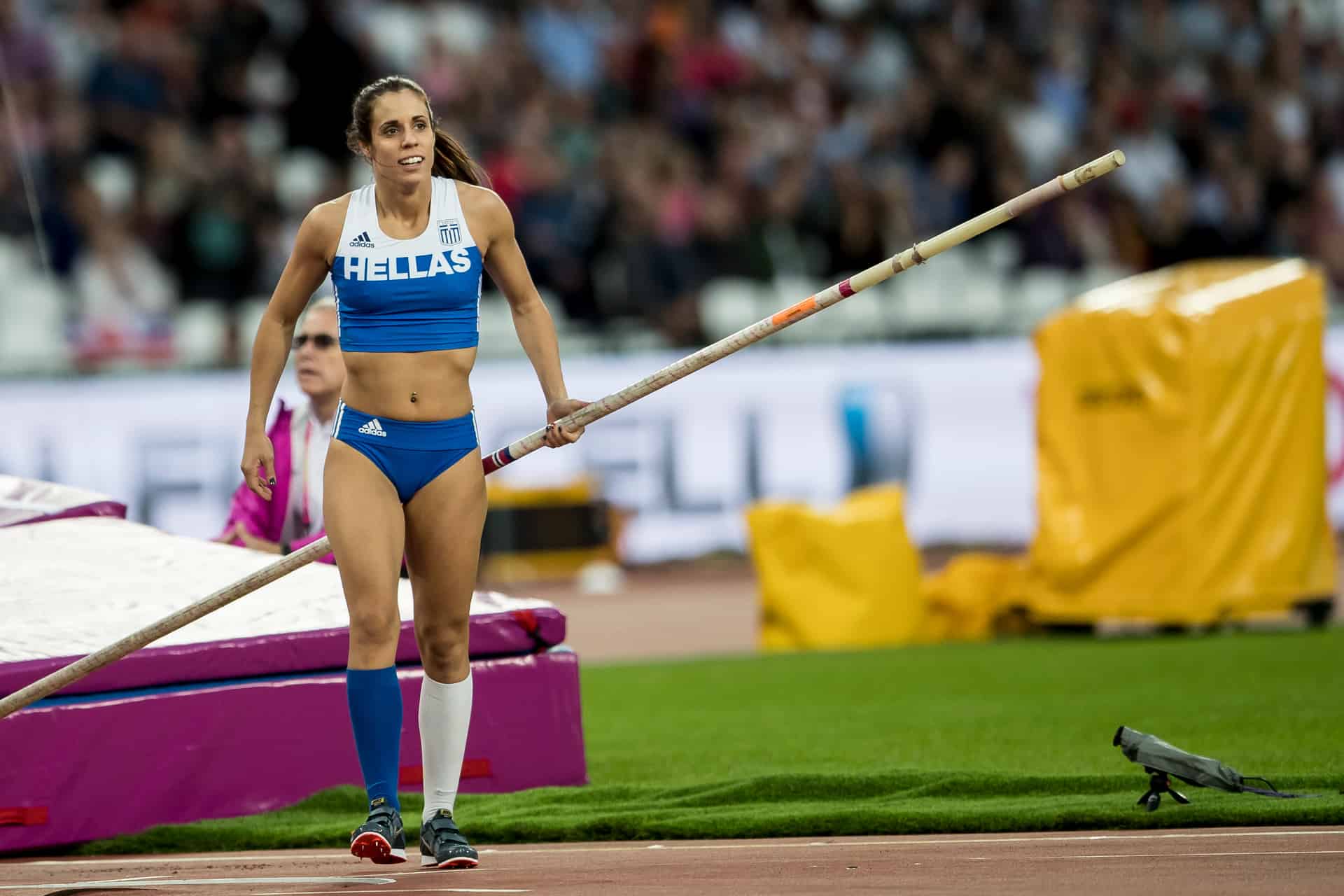
What made you leave Greece for the United States?
Stanford was too big of an opportunity to miss out on. While I wasn’t too fond of leaving my country I decided to try it out for a quarter and absolutely loved it. I came to the US for a Stanford education. Never did I think about elite sports at the time. I just wanted to use my talent in pole vaulting to get a great education.
Greek athletes bring gold metals to their country. Have any of you have ever received government support, not only in terms of funding your trips but for your personal expenses as well?
Absolutely. I am one of few Greek athletes with international success since I was 13 years old (a very different time for Greek athletics compared to now of course). Greece supports athletes in two main ways. One is through the Federations. Money goes from the government to the federations and then trickles down to the athletes. Depending on your level you might only get free therapy or you might get a sum of money for training camps and competitions, or you might get a salary and even bonuses based on your success/medals. The second way Greece supports its athletes is through the ministry of sport itself. This is only for athletes that bring medals from major championships, but Greece has a decent reward system for their athletes. Of course, it used to be way better back in the 2004 era as opposed to now. But as you can see there is quite a decent system for supporting successful athletes in a country with so many financial problems. Could it be better? Yes. Could the facilities be better? Sure. Could the federations and government do a better job attracting private companies as sponsors? Absolutely. But I can’t really complain.
How do you feel every time you win a medal?
Every time is different. It depends on the expectations, it depends on my health, my performance. Every time is completely different. The one thing I can tell you is that whether I win or not, or even get a medal, I give myself 24 hours to be happy or sad and then life goes on. This is the definition of sport. You have to constantly be on the top of your game.
Do you have a word or mantra that you say to yourself when you’re competing?
Not really.
What do you rank as the ultimate highlight in your career?
This is impossible to choose. Obviously winning in Rio is high up there but I think I might rank London 2017 as #1. To come back from a dream 2016 season to an even better 2017 season was special. Often athletes struggle to find motivation the year after winning the Olympics. I did the exact opposite. I used my success as motivation. I will never forget breaking the national record in a filled stadium in London with everyone dancing to Zorbas. It was definitely a special moment.
If you had to choose between a husband-kids-a house and pole vaulting, what would you choose?
I would choose what I have now, pole vaulting with my husband as a coach haha. I can’t quite talk about kids, right now. I would rather have cats, dogs, goats and horses.
Explain the primary emotions you felt when you gained an athletic scholarship at Stanford University. Also, tell us of the importance of obtaining your master’s degree in cognitive psychology?
When the Stanford coach called me to tell me I was accepted I said “ah ok thank you”. The exact opposite of what you see in my movies haha. No excitement. In fact my stomach dropped. I now had a decision to make, and as I explained earlier I didn’t really want to go. Looking back now, Stanford was one of the most amazing experiences of my life, and I say this now, after several major Championship wins and medals. I still close my eyes and remember biking across campus back to my dorm at night. Smelling the amazing smells of all the trees and wildflowers. This is to this day one of my happiest memories.
I don’t really see the importance in obtaining a master’s degree in cognitive psychology. I think the only “importance” if any is the fact that at a difficult time in my career (transitioning into the seniors) it gave me something else in my life to distract me from the stress of having to pole vault high. I think studying, especially at the time, gave me something to fall back on if and when pole vaulting wasn’t going as I was hoping.
What are your hobbies and how do you unwind after a long day of training?
Generally, I sleep! I sleep a lot which doesn’t allow for too much time for much. The older I get the more I have to take care of my body outside of training and that takes even more time away from hobbies. My husband has always been into construction. When we moved to Cleveland we bought a foreclosed house and started slowly renovating it. Of course, we had to travel 6 months out of the year it took us a bit longer than we thought but I really enjoyed that process. We then moved on to building our own training facility in the Rocky Mountains. We actually just finished about a month ago. We are now helping some friends renovate a cabin while waiting for the engineer and the county to approve our plans for our future house, which, you guessed it right, we will be ourselves. I guess in a way right now, building is what I do in my off time.
How difficult is it to have your husband as your coach?
Not at all difficult for us. From the very beginning we had certain rules of how to handle professional and personal relationships and it has never become an issue. In fact, I believe it has generally helped my career, as I get to travel all over the world with my husband and have him there for the good and the bad.
What is your next goal?
Our biggest goal of the year is the World Championships in Eugene this summer, followed by the European Championships. Last year I took a huge risk and change the length of my poles. This was probably not the best decision on an Olympic year but I felt like we had to pull the trigger at some point. I believe these longer poles could get me to the world record if I can stay healthy. I have watched my competitors over the years make the same switch and I have no doubt I handled it better than anyone which gives me a ton of confidence to continue to pursue these long poles in the upcoming season.
How fulfilling is it to realise one's dreams?
Realising your dream can be tricky. Many think that you win the Olympics and your life changes. That’s not the case. My everyday life remained the exact same. Except that for the next 4 (5 for me) years every time I competed and didn’t do well I felt like everybody was focusing on my failure. It is a very self-centered way of thinking but this comes with success. You think that all eyes are on you for the good and the bad. I now realized that nobody really cared but me. Realising your dream can be a very difficult thing to handle in the long term. Many athletes struggle massively with a lack of motivation. I feel like I personally handled it very well. I think the reason why is because while I always dreamt of winning the Olympics I pole vaulted because I loved it and not just to get success or fame. And I believe this is the difference between athletes that win one championship and athletes that win medals for years and years to come.
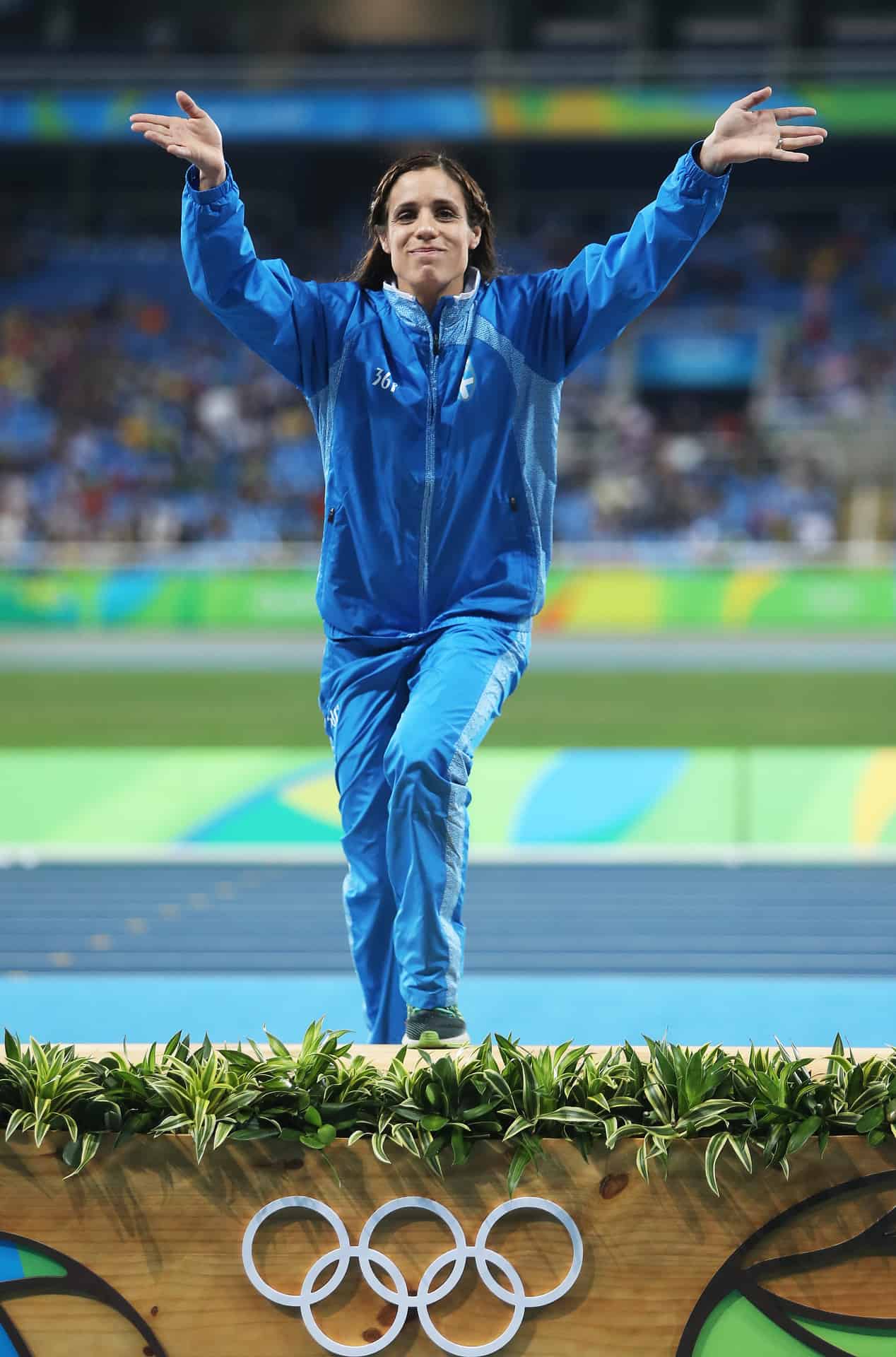
Photo Courtesy of Angelos Zynaras
IG: @angeloszymaras.com
Web: www.angeloszymaras.com
www.azsportsimage.com

